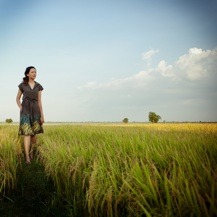
“This time around it was very beneficial to enter with our plan because we had completely changed it. I also found it valuable to get outside perspective on our work because its sometimes hard to see the bigger picture when I’m in Cambodia working long hours on sometimes seemingly inane and trivial things that are necessary to make the business run.”
Tonle is a fair trade company that creates its fashions and accessories out of leftover fabric scraps from other factories. They are also focused on creating jobs for rural women in Cambodia. Tonle fabrics are sold online and in shops across the United States, Australia, Europe and Asia. CEO Rachel Faller began her business journey with a Fulbright scholarship to study Fair Trade manufacturing in Cambodia.
2013 Interview
Number of people you employ?
Currently we employ 40 people. This number includes both our managerial staff and our artisans
Where are you located?
We are located in Phnom Penh, Cambodia.
Who are your customers?
This is a bit different because Morale has two branches so there are two unique customer bases.
KeoK’jay’s customers are mainly travelers and expats in Cambodia. Most of the people in those groups are from the US, Europe and Australia but we are starting to see more from Japan, Korea and Singapore. These people, especially the tourists, are attracted to our clothing because it is the same price or cheaper than what they could get a tome and there is a better story for them to take back from their trip. We also export about 20% of our products to the US, Europe and Australia. Currently about 5% of our customer base are Cambodians. This is a small number because in Cambodia the wealthier people want name brands and members of the middle class see our products as too expensive for them. But our Cambodian market is growing as more people are becoming interested in our style and see the benefit of paying the premium for ethically sourced clothing.
For Samaki, most of our customers are overseas. They include sports teams and small businesses but are typically designers who are ordering small-medium lines from us. In doing this they can market themselves as ethical and transparent brands. They also use Samaki as a way to use our ethically and sustainably produced clothing without having to compete with themselves or us.
Are you making a net profit?
Last year we generated a net profit but this year we don’t expect to do so because we have recently made some strategic investments through our hiring of new managerial staff and the purchasing of new equipment. After our new staff and equipment have been working and are settled in we expect to grow even more.
What problem are you trying solve?
Morale Fashion Group is trying to solve two problems. On a smaller scale we are working towards building better jobs and livelihoods for women in Cambodia. In a broader sense we are also attempting to change the garment production industry as a whole.
On the small scale we see that there are not a lot of jobs available for people with limited education. Typically, people in Cambodia who don’t have a formal education are also from backgrounds that leave them further disadvantaged and excluded from safe and secure jobs. So we are working to develop a business that provides jobs to these underserved populations, especially women, though we are not averse to hiring men. We also work closely with a number of NGOs who train women to sew and then we hire them and give them further training in the production of specific garments and provide them with a stable income, benefits and time off. As a result of having a secure and safe job we have seen larger numbers of these women’s children attending school and the health of entire families improving because they are able to get time off and pay for doctors when they need to see them.
In terms of the garment industry as a whole I saw that there were a lot of human rights violations and environmentally unsustainable practices in place and that these needed to be changed. At Morale our employees are given a job that allows them to grow and be fulfilled. Our artisans are able to work on various aspects of a garment and to work on different garments in order to expand their skill set and not be on an assembly line. So seeing the changes that need to be made and the positive effects that come with making them solidifies the need for a scalable business or businesses with centralized and standardized production but that allows for collaboration and growth.
How did you become interested in that problem?
I have been interested in fashion my whole life and have always considered myself an artist. My grandma taught me how to sew and in high school I toyed around with the idea of being a fashion designer and was always wearing clothing that I had made. But I always held back because I saw the problems with the garment and fashion industry as a whole. I thought to myself, how can I participate in an industry that has so many flaws and human rights violations and creates so much waste through the production and consumption of the clothing? And in college I studied garment and textile production and so I was, once again, surrounded by the industry and began thinking of using my love of fashion to create social change.
In 2007 I traveled to Cambodia with a friend who was researching to start a clothing business there and was really inspired by what I saw in the fair trade sector. I knew a little bit about fair trade before my trip but during my stay I was able to really observe it in action and saw the problems they were having with scaling and growth. With that in mind I came back to Cambodia in 2008 on a Fulbright grant to research both how fair trade was working in the region and also the beautiful fabrics. Through my research I was also able to learn about the business side of garment production which was very beneficial because I didn’t have any experience in business.
So with all that I had learned I kind of took over the business idea that my friend had proposed, because she ultimately didn’t continue with it, and here we are today.
What is your solution to the problem?
I think that for the whole industry the issues have to be solved on a policy level. The brands need to tell the producer to shape up and the consumers need to tell the brands to shape up.
At Morale we are also trying to provide the consumer with an alternative to the clothing being produced in the mainstream. With KeoK’jay we work very hard to make our prices comparable to that of Anthropologie or other similar retailers so that consumers can afford the alternative they are looking for.
With Samaki we see the solution as being a presence for fashion designers to ethically and sustainably source their product. When a designer orders a line from us they can trace their product back to the source and the consumer appreciates that and the brand can promote transparency.

How has the William James Foundation competition and mentoring program helped you?
Well this is actually the third time I have entered the Sustainable Business Plan Competition and each time has been a beneficial experience. The first time, in 2009, we were very small and I had no idea what I was doing. The feedback reflected the fact that I had only found out about the competition two days before the deadline but it was so valuable because it sparked numerous questions that were constructive and helpful. I really realized what I needed to be working towards.
The second time, in 2010, we were a finalist for the LOHAS prize and got to got to Boulder to present our plan. This was great because of the connections we formed. We were also once again able to refine our plan and we are still in contact with some of our judges.
This time around it was very beneficial to enter with our plan because we had completely changed it. I also found it valuable to get outside perspective on our work because its sometimes hard to see the bigger picture when I’m in Cambodia working long hours on sometimes seemingly inane and trivial things that are necessary to make the business run.
What are your major challenges?
There are a few challenges that we have been faced with recently. The first is the ongoing struggle to find qualified skilled management personnel. This is so hard because Cambodians who have formal management education don’t often know how to sew or have knowledge of the industry because its not a particularly cool job, so finding the right people for the jobs. Once we’ve found and hired them its also difficult to keep them because people with management skills and training are very valuable and so we have to work hard to make sure they stick around.
We are also trying to overcome the challenge of keeping our clothing at a reasonable price point that our customers can afford and are willing to pay. This is difficult because we want to make it affordable but we also have a duty to our employees to provide them with a stable liveable wage and benefits.
And lastly, as I’m sure most entrepreneurs can sympathize with, we are always looking for capital to finance our growth. Organically we’ve been growing some but we are now getting to the point where real investments need to be made in order to scale and further our mission.
By Madeline Parrish, Communications Intern